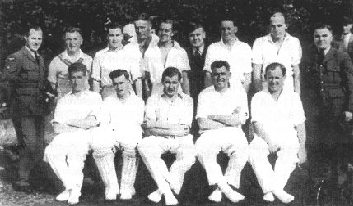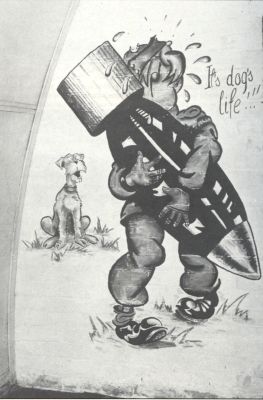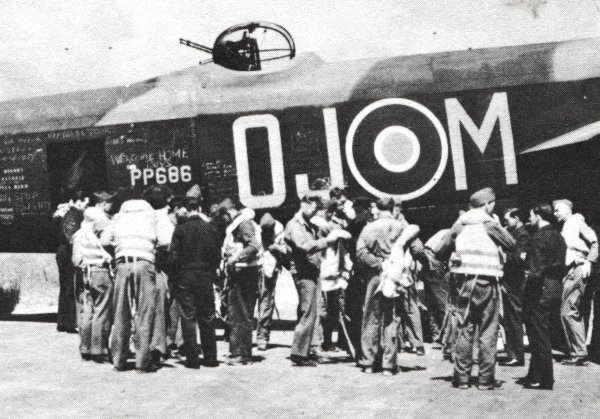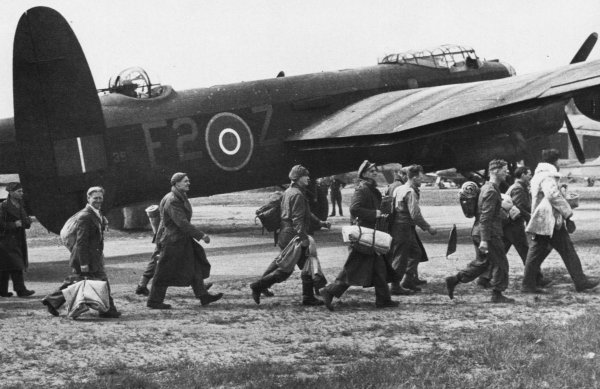
Binbrook is a village in East Lindsey district of Lincolnshire, England. It is home to the site of the Binbrook Airfield, originally opened as RAF Binbrook.
In the summer of 1940 a Fairey Battle light bomber, piloted by Flying Officer Doug Gosman, touched down on the grass strip that served as a runway at RAF Station Binbrook, opening a new chapter in aviation history.
This was the first operational aircraft to land at Britian's newest airfield, opened only days after the evacuation from Dunkirk, at a time when invasion by the Germans seemed imminent.
 Fairey Battle light bomber - a british single-engine light bomber
Fairey Battle light bomber - a british single-engine light bomberBinbrook went on to play a vital role in the final defeat of Germany, serving as a base for Fairey Battles, then Wellingtons of 12 and 142 squadrons and later the Lancasters of 460 Squadron, Royal Australian Air Force.
In 1908, before anyone thought much about aeroplanes, Thomas Richard Cottingham bought his farm, 500 acres of high level ground of Lincolnshire Wolds countryside. When he died in 1917, his son Roland returned from serving with the Lincolnshire Yeomanry in Palestine and took over the reins.
In 1938, the Royal Air Force approached the Cottinghams who agreed to sell their 500 acres. RAF Station Binbrook was then established.
The airfield was one of a string planned as part of Britain's rearmament programme. Unlike most of the war time RAF establishments that sprung up in North Lincolnshire, it had brick built hangers, substantial accommodation and messes. Despite this, Binbrook lacked concrete runways and an unserviceable airfield during wet weather hampered its operational ability until this defect was corrected.
One of the first aircraft to be lost from Binbrook was Fairey Battle L5568. On July 31, 1940, it was one of six sent on what proved to be an abortive raid on German shipping targets. On its way back, the Battle was attacked by British fighters near Marblethorp. The crew of three were killed. These were dangerous days for Britain, days when to shoot first and ask questions later was the unfortunate consequence of constant enemy attacks. The crew of three were interred in Binbrook's churchyard, sadly the first of many.
In November, 1940, Binbrook began to convert to Vickers Wellingtons. This was a bigger, faster aircraft that carries a much heavier bomb load.
 Wellington Mk III RCAF 419 Squadron VR Q Z1572 RAF Lakenheath Mildenhall Suffolk 1942
Wellington Mk III RCAF 419 Squadron VR Q Z1572 RAF Lakenheath Mildenhall Suffolk 1942Operations began seriously on April 9, 1941, Emden was the target and one Wellington from 12 Squadron, piloted by the C.O., W/C Blackden failed to return.
Constant involvement in operations over Europe, including raids on Berlin, continued during 1941 and on April 1, Binbrook lost its 50th aircraft when a Wellington failed to return from a raid on Le Havre.
July, 1942, was an appalling month for Binbrook's crews. Seventeen aircraft were lost on raids on the Ruhr and U–boat bases in Northern Germany. By September another thirty one more had gone missing.
On the 26th September, contractors moved in to start laying concrete runways so the Wellingtons moved to Wickenbyand and Grimsby.
A decision had been made about the new occupants. Australians.It was towards the end of April, 1943, when the first Australian accents were heard in Binbrook's pubs. Led by G/C Hughie Edwards, VC, an advance party visited the base to make preliminary arrangements for the transfer of 460 Squadron, RAAF from Breighton, near York on May 14, 1943.

Grimsby and Market Rasen were places to visit but none so popular as The Marquis of Granby pub in Binbrook village. Rene Trevor ran the Marquis of Granby throughout the war. She was the licensee but found herself thrust into the role of "mother" to hundreds of young Australian airmen. She sewed on buttons and new decorations, mended jackets and cooked meals for the young men who flew the bombers from Binbrook between 1940 and 1945. The youngsters who flew those aircraft never forgot Rene Trevor.
She had been brought up in Tealby where her father ran the Crown Inn for 43 years and it seemed natural for Rene and her husband to go into the licensed trade themselves. This they did in November 1939, just after their daughter, Anne, was born.
Her husband was posted to the Middle East and Rene was left to run the pub.

The first airmen to arrive at the Marquis of Granby were the crews of the obsolete Fairey Battles. Rene can remember them saying, "A real English Pub with a piano –– can you play it?"
Rene could and she could sing too. That started a relationship between the Granby, its landlady and the boys of Bomber Command.
Songs such as 'Cowboy Joe' and 'Good night Sweet–heart' were to become familiar at the pub throughout the war years.
Aircrew would walk or cycle down to the Marquis every night they could for a pint or two of Holes Ale (later Hewitts, Guinness or whatever else she could obtain) or maybe she would serve her famous meal –– sausage, two eggs and toast, for 1s.6d. After the party was over there would be the riotous departure. Everyone grabbing his bike and setting off mostly? in the right direction, with plenty of the airman's language like " Come on you bloody navigator give me a course or we'll be over the target before we get airborne,' "Come on where's my rear gunner, I don't want to be shot up you know, because my rear gunner is pissed as a parrot" This frivolity lasted till the bottom of the hill then it was, "Oh, bugger this bike, let's walk home". Next morning it was down the hill and collect the bike before breakfast.
She still remembers the day the Australians moved in. "My daughter Anne was about three at the time and we had just begun to tell her about the war and about the Germans. One day she came running in screaming, "Mummy, Mummy, the Germans are here!" She had just heard an Australian accent for the first time.
Despite the fearful odds, 460 Squadron lost more aircrew than any other in Bomber Command, many did complete their 30 trip tour of operations and on each occasion there was another party in the back room of the Granby.
One of the traditions at these parties was for the airmen who had successfully finished their tour, to be held aloft while they wrote their names on the ceiling of the room. I well remember Rene's father's birthday, when he was hoisted on shoulders, and held while with a candle he burned "Pop 60" into the beam.
In the corner of the South Eastern wall at face height was written this poem.
Perhaps those names, the poems and the adornments are still there under several coats of paint.
Mrs. Rene Trevor now lives in a flat on Cleethorpes sea front. Over her fireplace hangs 460 Squadrons Kangaroo and Boomerang crest baring the motto "Strike and Return".
"Oh, they were marvellous days. They were wonderful boys and I knew just about every one of them."
And Binbrook village has not forgotten. In front of St. Mary's church is a well tendered memorial to 460 Squadron.
 460 squadron team in mid 1944 winners of the local competition defeating Grimsby in the final.
460 squadron team in mid 1944 winners of the local competition defeating Grimsby in the final.

 Dutch families being flown back to Holland.
Dutch families being flown back to Holland.
